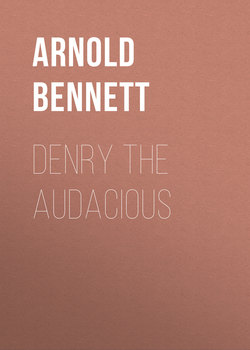Читать книгу Denry the Audacious - Arnold Bennett - Страница 13
CHAPTER II. THE WIDOW HULLINS'S HOUSE
V
ОглавлениеYou could not be elected to the Sports Club all in a minute. There were formalities; and that these formalities were complicated and took time is simply a proof that the Club was correctly exclusive, and worth belonging to. When at length Denry received notice from the "Secretary and Steward" that he was elected to the most sparkling fellowship in the Five Towns, he was, positively, afraid to go and visit the Club. He wanted some old and experienced member to lead him gently into the Club and explain its usages and introduce him to the chief habitués. Or else he wanted to slip in unobserved while the heads of clubmen were turned. And then he had a distressing shock. Mrs. Codleyn took it into her head that she must sell her cottage property. Now Mrs. Codleyn's cottage property was the backbone of Denry's livelihood; and he could by no means be sure that a new owner would employ him as rent-collector. A new owner might have the absurd notion of collecting rents in person. Vainly did Denry exhibit to Mrs. Codleyn rows of figures showing that her income from the property had increased under his control. Vainly did he assert that from no other form of investment would she derive such a handsome interest. She went so far as to consult an auctioneer. The auctioneer's idea of what would constitute a fair reserve price shook, but did not quite overthrow, her. At this crisis it was that Denry happened to say to her, in his new large manner: "Why! if I could afford, I 'd buy the property off you myself, just to show you…!" (He did not explain, to show her, and he did not perhaps know himself, what had to be shown.) She answered that she wished to goodness he would! Then he said wildly that he would, in instalments! And he actually did buy the Widow Hullins's half-a-crown-a-week cottage for £45, of which he paid £30 in cash and arranged that the balance should be deducted gradually from his weekly commission. He chose the Widow Hullins's because it stood by itself – an old piece, as it were, chipped off from the block of Mrs. Codleyn's realty. The transaction quieted Mrs. Codleyn. And Denry felt secure because she could not now dispense with his services without losing her security for £15. (He still thought in these small sums instead of thinking in thousands.)
He was now a property owner.
Encouraged by this great and solemn fact, he went up one afternoon to the Club at Hillport. His entry was magnificent, superficially. No one suspected that he was nervous under the ordeal. The truth is that no one suspected because the place was empty. The emptiness of the hall gave him pause. He saw a large framed copy of the "Rules" hanging under a deer's head, and he read them as carefully as though he had not got a copy in his pocket. Then he read the Notices, as though they had been latest telegrams from some dire seat of war. Then, perceiving a massive open door of oak (the club-house had once been a pretty stately mansion), he passed through it, and saw a bar (with bottles) and a number of small tables and wicker chairs, and on one of the tables an example of the Staffordshire *Signal* displaying in vast letters the fearful question: "Is your skin troublesome?" Denry's skin was troublesome; it crept. He crossed the hall and went into another room which was placarded "Silence." And silence was. And on a table, with copies of The Potter's World, The British Australasian, The Iron Trades Review, and the Golfer's Annual, was a second copy of the Signal again demanding of Denry in vast letters whether his skin was troublesome. Evidently the reading-room.
He ascended the stairs and discovered a deserted billiard-room with two tables. Though he had never played at billiards he seized a cue, but when he touched them the balls gave such a resounding click in the hush of the chamber that he put the cue away instantly. He noticed another door, curiously opened it, and started back at the sight of a small room and eight middle-aged men, mostly hatted, playing cards in two groups. They had the air of conspirators, but they were merely some of the finest solo-whist players in Bursley. (This was before Bridge had quitted Pall Mall.) Among them was Mr. Duncalf. Denry shut the door quickly. He felt like a wanderer in an enchanted castle who had suddenly come across something that ought not to be come across. He returned to earth, and in the hall met a man in shirt-sleeves – the Secretary and Steward, a nice homely man who said, in the accents of ancient friendship, though he had never spoken to Denry before: "Is it Mr. Machin? Glad to see you Mr. Machin! Come and have a drink with me, will you? Give it a name." Saying which, the Secretary and Steward went behind the bar, and Denry imbibed a little whiskey and much information concerning the Club.
"Anyhow, I 've been!" he said to himself going home.
